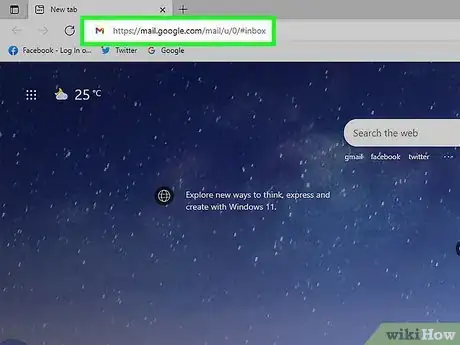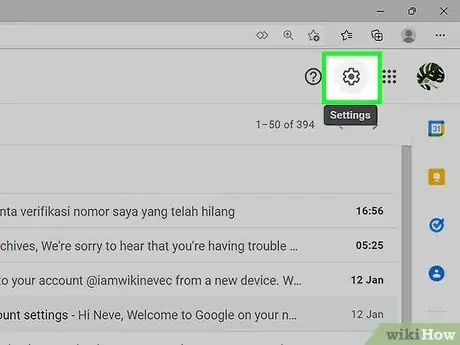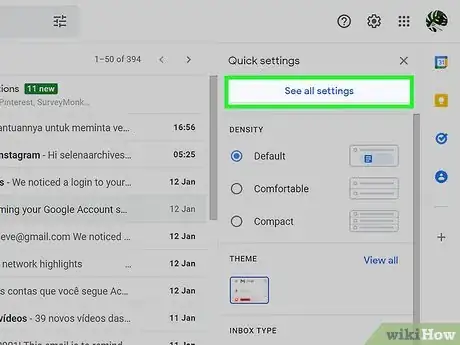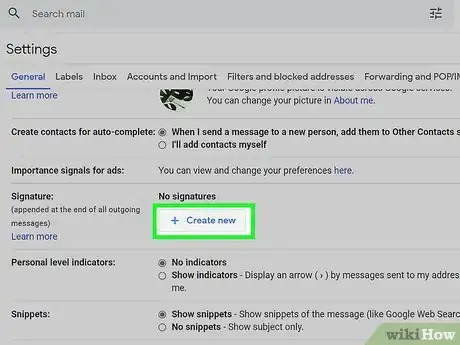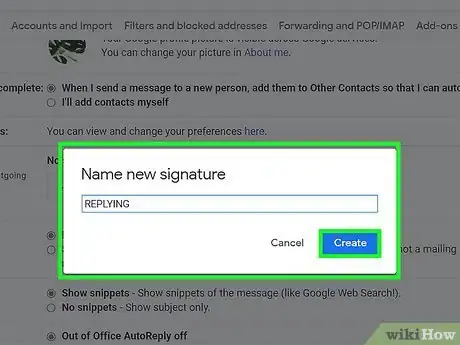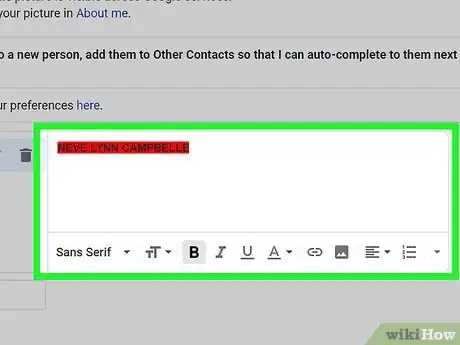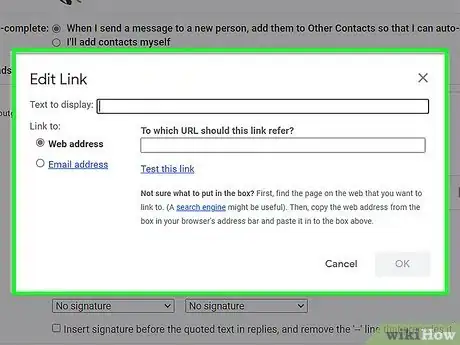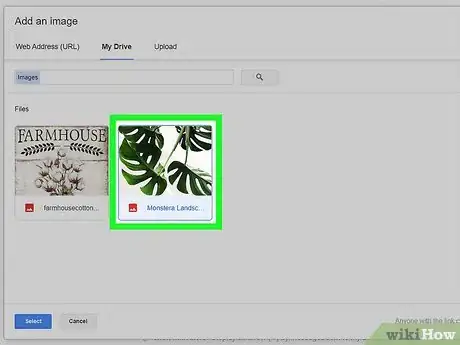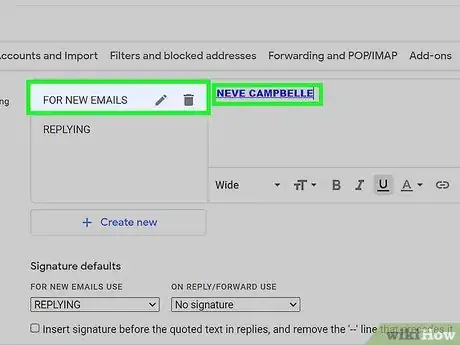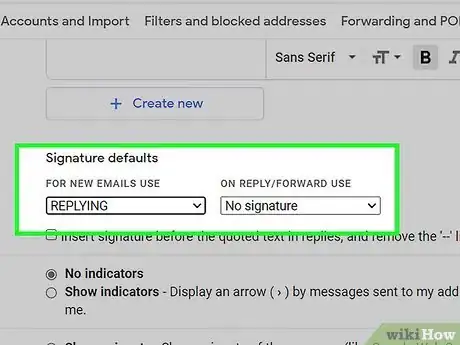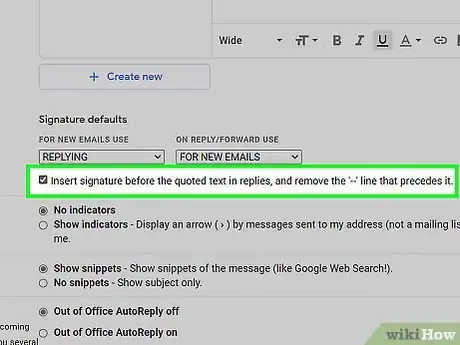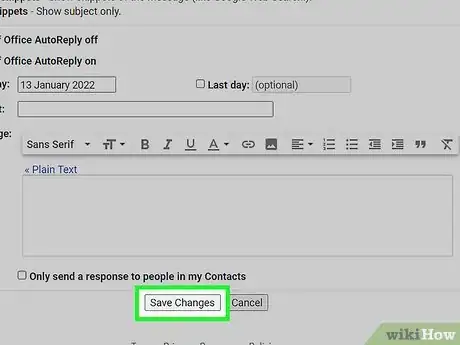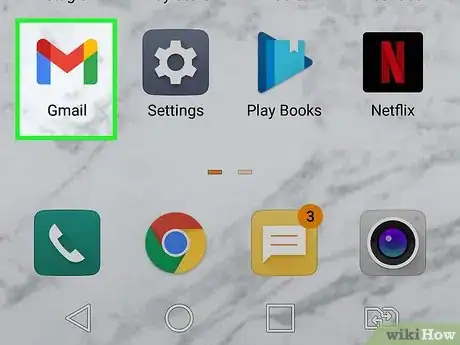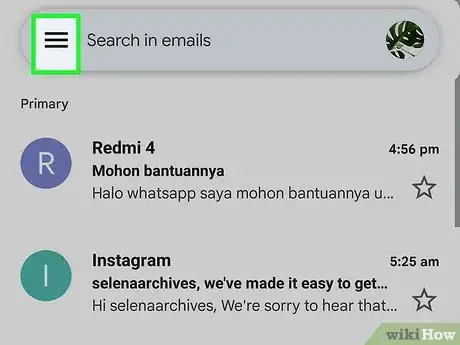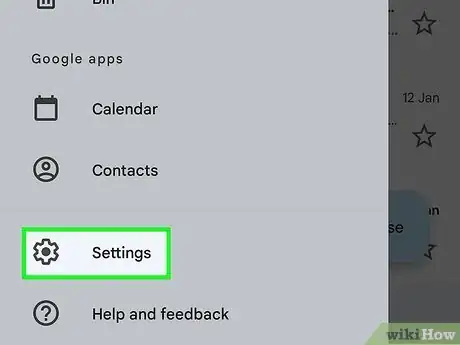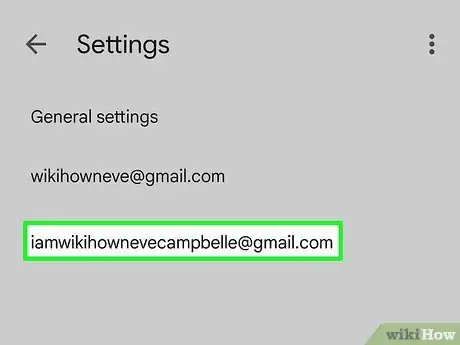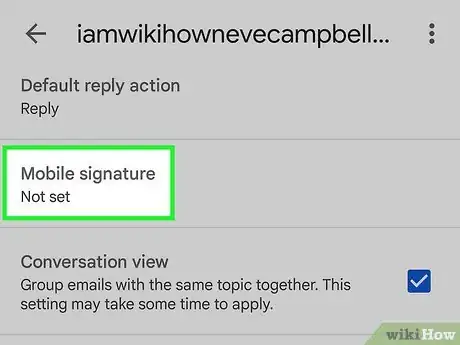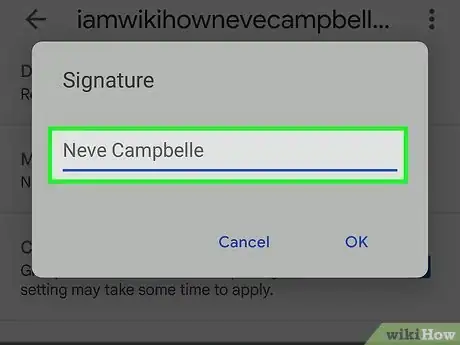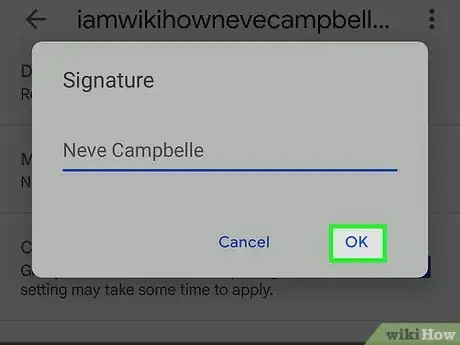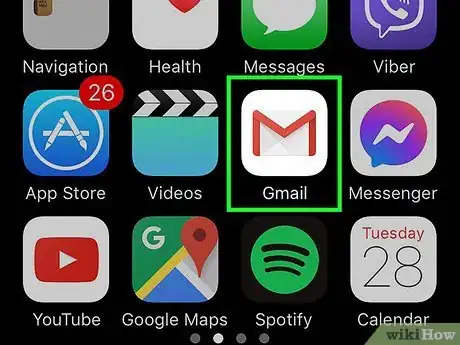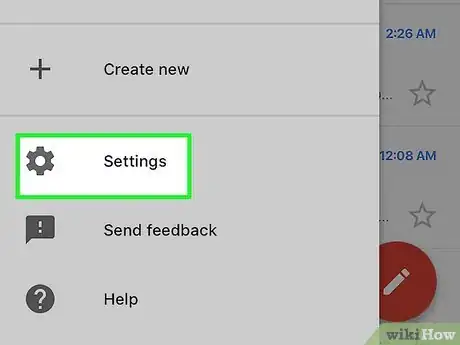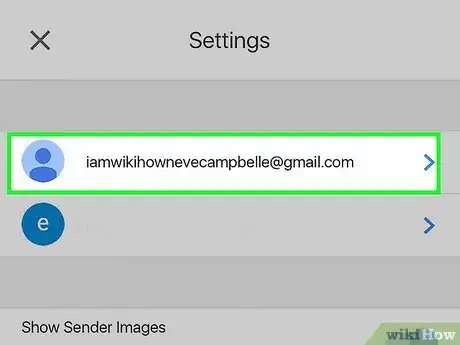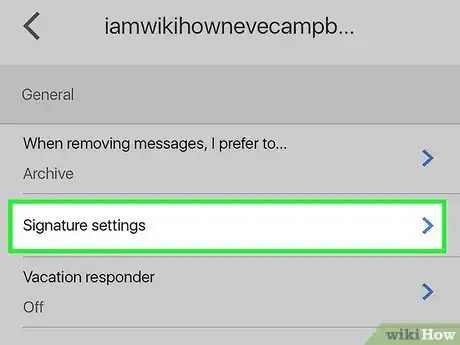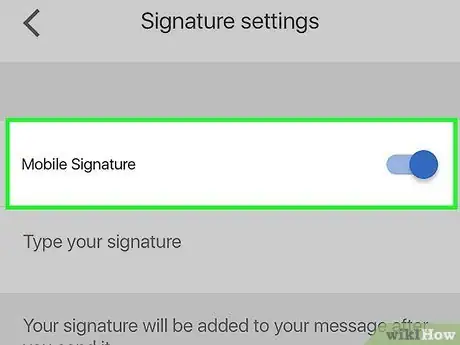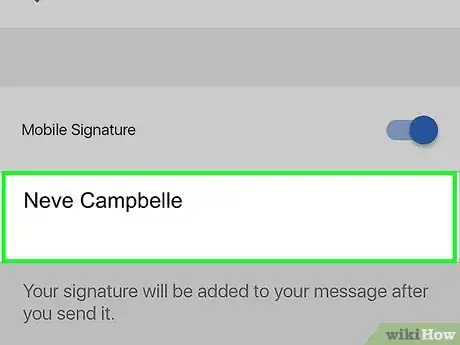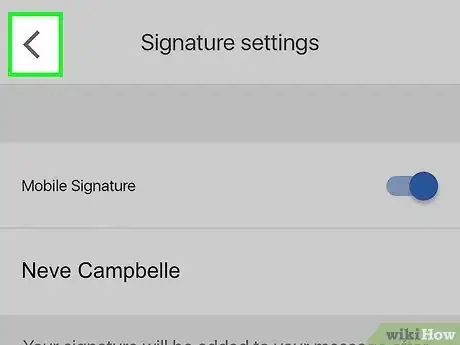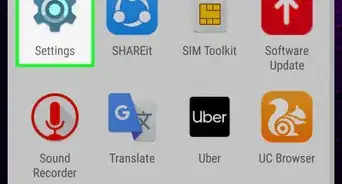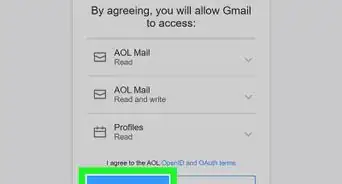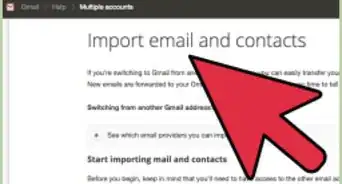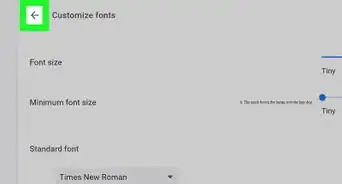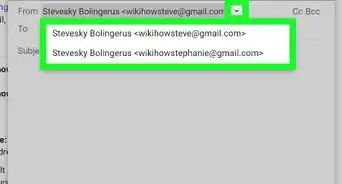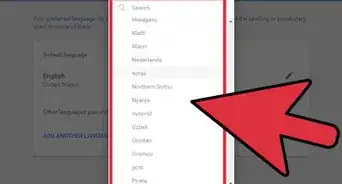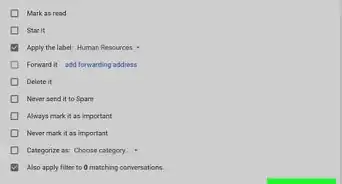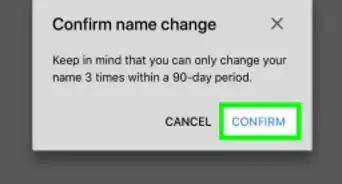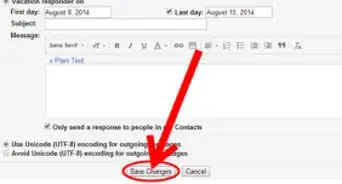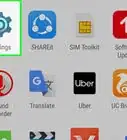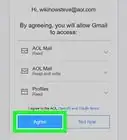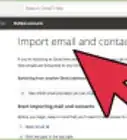This article was co-authored by wikiHow staff writer, Darlene Antonelli, MA. Darlene Antonelli is a Technology Writer and Editor for wikiHow. Darlene has experience teaching college courses, writing technology-related articles, and working hands-on in the technology field. She earned an MA in Writing from Rowan University in 2012 and wrote her thesis on online communities and the personalities curated in such communities.
wikiHow marks an article as reader-approved once it receives enough positive feedback. In this case, 100% of readers who voted found the article helpful, earning it our reader-approved status.
This article has been viewed 454,045 times.
Learn more...
If you want to appear professional or make your emails easily recognizable, you may want to add a signature to all your Gmail emails. Fortunately, it's a simple process to add a signature to your Gmail account, and this wikiHow article will teach you how.
Steps
Creating a Signature on a Computer
-
1Open Gmail. Ensure that you are logged in with the address that you want to add a signature to.
-
2Advertisement
-
3Click See all Settings. It's usually the first option in the menu under the "Quick Settings" header.
-
4Click Create new. You'll need to scroll down the page to find the "Signature" section of Settings under the General tab (which is selected by default). The section headers are on the left side of the menu while the menu items are on the right.
-
5Enter a name for your signature. This should be descriptive of what it is used for, like "Replying" or "For New Emails" so you know when to use it.
- Click Create when you're ready to continue.
-
6Type your signature in the text field. You can type anything you'd like into the signature field, and use the text formatting tools to give your signature a custom look. Signatures commonly include your name, place of employment and title, and your contact information.
- You can change the font, color, weight, and more using the text formatting tools located at the bottom of the text field. A signature should be easy to read and professional. A distracting signature will make you look less professional to the recipient.
-
7Add links to your signature. If you have other websites that you want to link to in your signature, you can add them by clicking the Link icon at the bottom of the signature text field. It looks like a chain.
- Clicking the Link icon will open a new window. You can enter in the text that will be displayed for the link, as well as the actual address. You can also link to other email addresses.
-
8Add an image to your signature. Click the image icon (it looks like a picture of a landscape of mountains that you'll see below the signature text field). Another window will open and you can either use a URL, upload from your Drive, or upload an image from your computer.
- If you uploaded an image from your Drive, that image privacy needs to be set to public or it won't show up in your signature (change sharing from "Restricted" to "Anyone with a Link").
-
9Add different signatures for different addresses. If you have multiple email addresses associated with your Gmail account, you can have different signatures for each one. Click the drop-down menu below the signature text field (under the "Signature defaults" header) to choose which address you want to create a signature for.
-
10Assign your signature defaults. Under "For New Emails Use" and "On Reply/Forward Use" select which signature to use. This is why it's useful to make the names of your signatures something you can recognize, so you can use different signatures in different situations.
-
11Choose where you want the signature to appear. Check the box next to "Insert signature before quoted text in replies and remove the '--' that precedes it" to have the signature appear before any quoted replies. If you leave it unchecked, the signature will show up at the bottom of the message, beneath any quotes.
- You can add as many signatures as you'd like.
- If you want to edit the name of a signature, click the pencil icon. To delete a signature, click the trashcan icon.[1]
-
12Click Save Changes. It's centered at the very bottom of the page
Creating a Signature on the Mobile App on Android
-
1Open Gmail. The app icon looks like a red and white envelope.
-
2Tap ☰. This three-line menu icon is in the top left corner of your screen.
-
3Tap Settings. It's at the bottom of the menu next to a gear icon.
-
4Tap the Google account that you want to add the signature to. If you only have one Google account on your phone, you won't be prompted to pick an account and can skip this step.
-
5Tap Mobile signature. You'll find this under the "General" heading near the middle of the menu.
-
6Tap Mobile Signature. A blank window will open or your previous signature will display, and you can quickly set what you want here. Using mobile, you can only create and use simple signatures and don't have the text formatting options that are available when you're using a computer.
-
7Tap OK. Your signature will be saved and applied to future emails you send or reply to on your Android phone or tablet.[2]
- If you don't add a signature in the mobile app, your emails will instead display the signature you created from your computer.
Creating a Signature on the Mobile App on iPhone and iPad
-
1Open Gmail. The app icon looks like a red and white envelope.
-
2Tap ☰. This three-line menu icon is in the top left corner of your screen.
-
3Tap Settings. It's at the bottom of the menu next to a gear icon.
-
4Tap the Google account that you want to add the signature to. If you only have one Google account on your phone, you won't be prompted to pick an account and can skip this step.
-
5Tap Signature Settings. You'll find this under the "General" heading near the middle of the menu.
-
6
-
7Edit or add a signature. Tap the field below to enter your new signature or edit the one you have set up. Using mobile, you can only create and use simple signatures and don't have the text formatting options that are available when you're using a computer.
-
8Tap the backward-facing arrow. This navigational arrow will return you to the previous screen and save your current signature.[3]
- If you don't add a signature in the mobile app, your emails will instead display the signature you created from your computer.
Community Q&A
-
QuestionHi. I've added my signature website and email address under settings, but I can't get it to appear on the email I'm sending. HELP!!
 wikiHow Staff EditorThis answer was written by one of our trained team of researchers who validated it for accuracy and comprehensiveness.
wikiHow Staff EditorThis answer was written by one of our trained team of researchers who validated it for accuracy and comprehensiveness.
Staff Answer wikiHow Staff EditorStaff AnswerMany times when you're sending or replying to an email, your signature won't show up in the preview that you're writing. If the receiver doesn't see the signature, make sure you have the signature selected in "Settings > See all Settings > General tab > Signature."
wikiHow Staff EditorStaff AnswerMany times when you're sending or replying to an email, your signature won't show up in the preview that you're writing. If the receiver doesn't see the signature, make sure you have the signature selected in "Settings > See all Settings > General tab > Signature." -
QuestionHow do I not show my signature every time I send an email?
 Community AnswerGo to settings where you first enabled your signature and you will be able to turn it off there.
Community AnswerGo to settings where you first enabled your signature and you will be able to turn it off there. -
QuestionHow can I delete the -- above my Gmail signature?
 Community AnswerGo to Settings and check the box underneath the signature text field which says "Insert this signature before quoted text in replies and remove the "--" line that precedes it."
Community AnswerGo to Settings and check the box underneath the signature text field which says "Insert this signature before quoted text in replies and remove the "--" line that precedes it."
References
- ↑ https://support.google.com/mail/answer/8395?hl=en&co=GENIE.Platform%3DDesktop#zippy=%2Cedit-signatures
- ↑ https://support.google.com/mail/answer/8395?hl=en&co=GENIE.Platform%3DAndroid&oco=1#zippy=%2Cedit-signatures%2Ccant-see-my-signature-in-my-sent-messages%2Ccant-format-my-signature%2Ccant-add-an-image
- ↑ https://support.google.com/mail/answer/8395?hl=en&co=GENIE.Platform%3DiOS&oco=1#zippy=%2Cedit-signatures%2Ccant-see-my-signature-in-my-sent-messages%2Ccant-format-my-signature%2Ccant-add-an-image
About This Article
1. Sign in to Gmail.com.
2. Click the gear icon.
3. Click See all Settings.
4. Click Create new.
5. Enter a name for your signature.
6. Type your signature into the text field.
7. Add links to your signature.
8. Add an image to your signature.
9. Add different signatures for different addresses.
10. Assign your signature defaults.
11. Choose where you want the signature to appear .
12. Click Save Changes.
